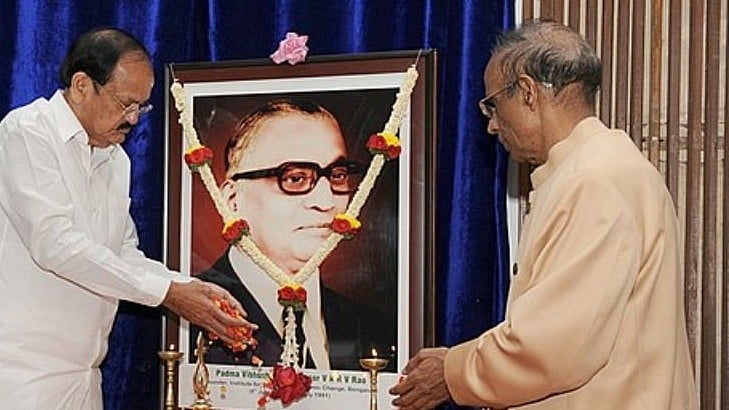
M Venkaiah Naidu paying tributes to Dr V K R V Rao, at the Institute for Social and Economic Change, in Bengaluru on January 19, 2018.
Credit: Wikimedia Commons
If we consider individuals from Karnataka who have made significant contributions to social science research in India through dedicated effort, Prof Vijayendra Kasturiranga Varadaraja Rao (V K R V Rao) distinctly stands out. On his birthday (July 8), we honour this remarkable scholar and institution-builder, who established numerous social science research centres across the country.
Born in Kancheepuram and raised in Mumbai, Prof Rao studied at Cambridge and maintained deep ties with Karnataka. He was elected twice to Parliament, representing the Bellary constituency. Prof Rao also served as vice-chancellor of Delhi University and a member of the Planning Commission, offering guidance on education. He was instrumental in the founding of the National Sample Survey Office (NSSO), aiming to improve national income estimates and foster social science research.
Prof Rao was also the first Union Minister of Education from Karnataka, serving in Indira Gandhi's cabinet. He introduced reforms that bolstered social science research nationwide and later also held the portfolio of transport and shipping. After resigning from the Union Cabinet, he returned to Bengaluru, driven by his love for Karnataka, and founded the Institute for Social and Economic Change, realising his long-held dream of establishing a research institute in the city.
Prof V K R V Rao was an exceptional educator and founder of several key institutions. He established the Delhi School of Economics, where he appointed our former PM, Dr Manmohan Singh, as a professor. Later, he founded the Institute of Economic Growth in Delhi and the Institute for Social and Economic Change in Bengaluru.
As Minister of Education, he was instrumental in creating the Indian Council of Social Science Research in Delhi, along with Agro-Economic Centres, Population Research Centres, Demographic Research Centres, the National Sample Survey Organisation, Population Research Centres, and the Central Institute of Indian Languages. He served as vice-chancellor of Delhi University, launching the Delhi School of Economics and assembling renowned scholars such as Amartya Sen, Sukhamoy Chakravarty, Jagdish Bhagwati, Manmohan Singh, Tapan Raychaudhuri, A L Nagar, Raj Krishna, K N Raj, and Pranab Bardhan. He also established a strong sociology faculty with figures like M N Srinivas, Andre Beteille, and Veena Das. He served as a member of the Planning Commission under Pandit Jawaharlal Nehru. From 1967 to 1971, he was a minister in Indira Gandhi's Cabinet and was elected to Parliament from Karnataka's Bellary constituency, representing the Congress Party. He lived simply in Jayanagar until his death on July 25, 1991. Through his efforts, he impacted many economists and policymakers, including members of the Planning Commission and Economic Advisers, and contributed to numerous policies during Mrs. Gandhi’s tenure, who held him in high esteem.
After completing his education in Mumbai, Professor Rao graduated with a BA from Gonville and Caius College at Cambridge as an exceptional student, specialising in economics. He was part of the cohort taught by John Maynard Keynes and was recognised as one of Lord Keynes’ talented students and a persuasive speaker. He completed his doctoral thesis titled "The National Income of British India, 1931-1932" under Professor Colin Clark's supervision. This work was published in 1936 by George Allen and Unwin and became a pioneering study worldwide on calculating national income and its methodologies. Professor Rao authored 39 books and monographs and approximately 250 articles and delivered numerous lectures at national and international conferences. He was highly esteemed worldwide for his contributions to economics, receiving praise from Nobel laureates who visited ISEC during his tenure. Despite some of his contemporaries staying back in England, he returned to India.
Today, we celebrate Prof Rao’s impactful contributions to education, academic research, and training thousands of skilled social scientists. Karnataka values his work and the initiatives he fostered for its economy, such as decentralisation and federal financial relations. These efforts involved leading academicians and even the chief ministers of several states at ISEC. Late Prof Brahmananda wrote movingly, "The life of this great son of India was a saga of liberal giving. Probably few economists anywhere in the world have given so much to so many and yet taken so little for themselves and their families.”
(The writer is a former director of the Institute for Social and Economic Change, Bengaluru)